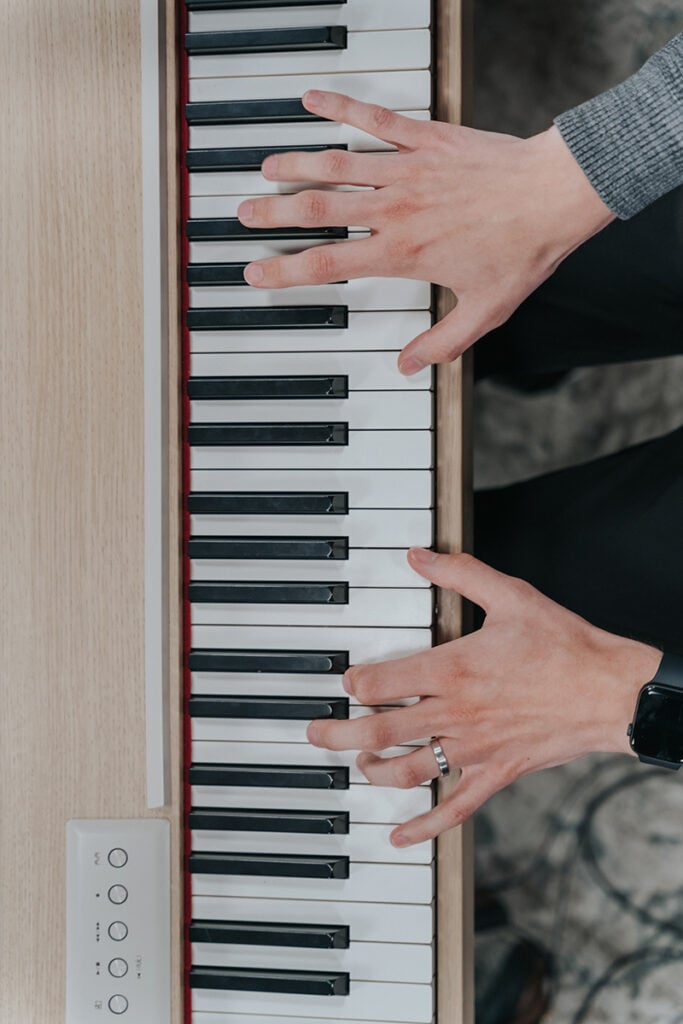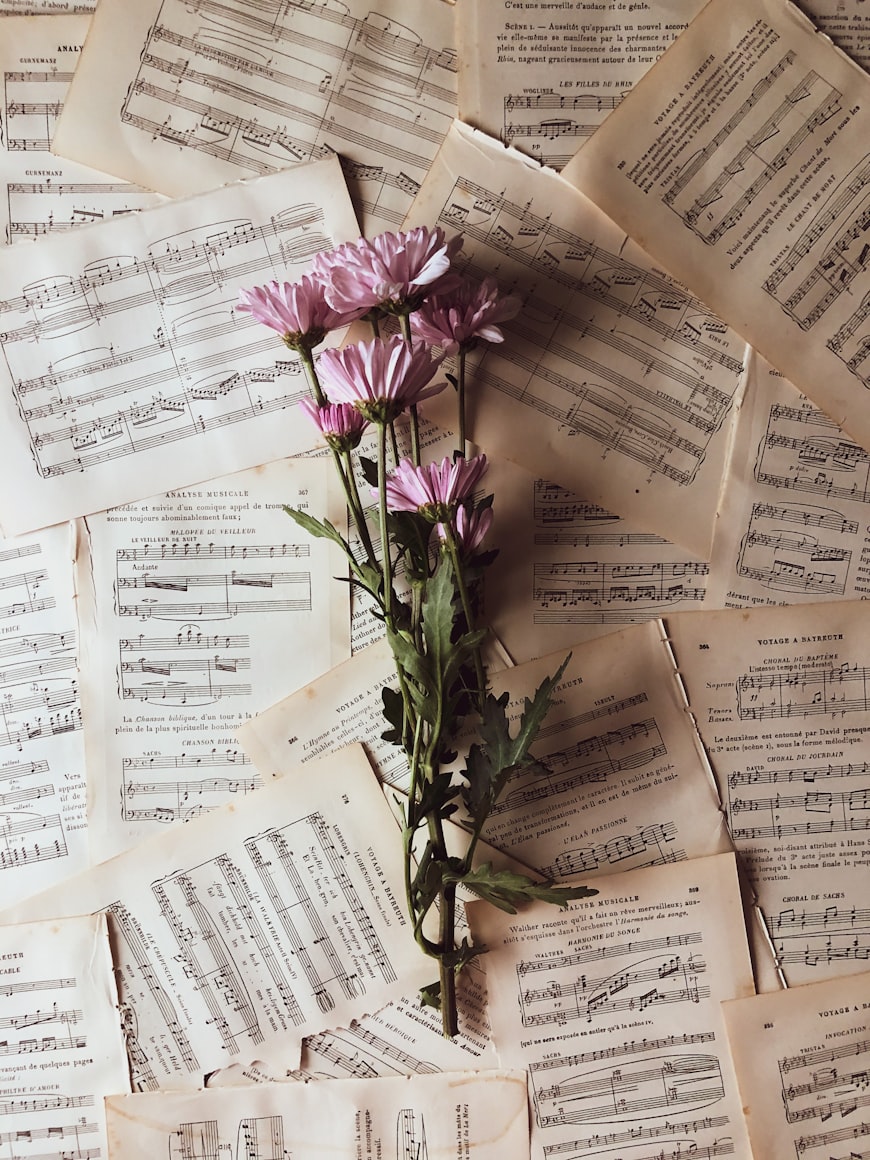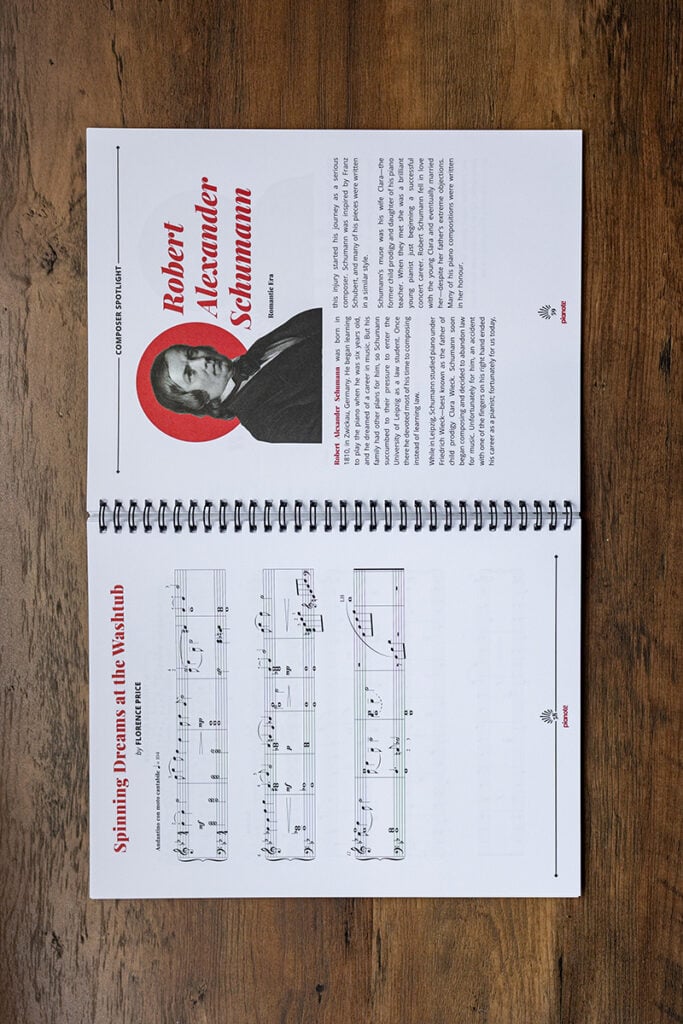
You’ve likely asked yourself: what is my piano level? How “good” am I at the piano?
This is a tough question to answer because there is no universal standard. And music is subjective, so a pianist considered advanced by one person may only be considered intermediate by another.
There are also many different styles of piano, and each requires a different set of skills. For example, sight-reading is a very important skill for classical players. But jazz players likely prioritize improvisation skills over sight-reading.
Regardless, understanding where you sit on the scale between beginner and expert can be helpful. In this article, we’ve come up with a holistic way to assess your piano ability level based on the genre you play. And we’ll also share some tips on how to get better.
Table of Contents:
Subscribe to The Note for exclusive interviews, fascinating articles, and inspiring lessons delivered straight to your inbox. Unsubscribe at any time.
If you’ve been learning how to play piano for a while, you know that piano is more than playing the right notes at the right time. Here are four general areas to consider if you want to know your piano level:
Technique is the physical aspect of playing an instrument. It includes speed, accuracy, hand independence, and articulation.
Remember: playing fast isn’t everything! Accuracy and an even tempo are just as—if not more—important. Most teachers will tell their students not to progress to a faster tempo until they can master the current tempo with accuracy.
Hand independence is one of the toughest skills to learn as a new piano player. But if you struggle with playing hands together, you’re not alone. Even expert pianists struggle with hand independence. That’s right—hand independence is a lifelong journey! If you’ve ever had to deal with Chopin’s polyrhythms, you know what I mean…
Technique is so important because it’s the difference between an okay pianist and a great one. Skilled pianists will articulate their notes in a clear and controlled way, making even simple pieces sound incredible.

Theory includes sheet music literacy and understanding concepts like intervals, chords, harmony, and rhythm. You may have wondered at some point, “How much theory do I actually need to know?” The answer, of course, is “it depends.”
Theory is worth the work if you’re interested in jazz because understanding theory goes a long way in helping you improvise and harmonize. A solid grasp of theory also helps classical pianists read music quickly. After all, music is a system of patterns, and theory lets you think of music as a “language.” Understanding these patterns and speaking this language opens doors.
Still, some musicians prefer a more intuitive approach to music, and many musicians go far with just lead sheets, chord charts, and playing by ear. It all depends on your goals.

You can think of musicianship as the “soft skills” in music. For jazz and pop pianists, this includes your improvisation, songwriting, and arranging skills. For classical pianists, this includes your expression, tone, interpretation, and memorization skills. Musicianship can also include knowing how to use tools and technology, such as DAWs (digital audio workstations).
Another key musicianship skill is knowing how to play in a group. Pianists can be stereotyped as lone wolves, but there is joy (and skill) to be gained by playing in a band, jazz trio, or as an accompanist.
Practice is also part of musicianship. Generally, the more advanced you are, the more you need to practice. It’s not uncommon for concertizing pianists to practice 5-8 hours a day.

Can you hold down a half-hour set? A two-hour set? How many pieces do you have memorized? If someone came up to you at a party and requested their favorite song, can you play it, or at least learn it quickly?
If you want to expand your repertoire, you don’t need to learn the most advanced version of every song right away. The great thing about jazz and pop music is that you can make a song as simple or complex as you want. You can even change up the style! Take these five levels of “Tiny Dancer” and these five versions of “Twinkle Twinkle Little Star.”
If you play classical repertoire, it’s okay (even encouraged) to return to earlier, easier pieces when you’ve gotten more advanced. It’s interesting to see how much you’ve improved!

At Pianote, we have a wide range of piano players. Some of us love jazz, others are classical nerds. So, I’ve organized piano ability levels into three main categories (jazz, classical, and pop) and listed typical skills achievable at each level. In general:
Please note that these charts are only guides. Use them to help you think about your abilities in a holistic way.
Classical piano players may want to refer to the Royal Conservatory of Music of Canada (RCM) or the Associated Board of the Royal Schools of Music (ABRSM) in the U.K. These are both very well-established music academies and they grade common classical pieces by levels. The music publisher Henle, which divides their classical sheet music into nine levels, is also often cited as a difficulty standard.
| LEVEL | TECHNIQUE | THEORY | MUSICIANSHIP | REPERTOIRE |
|---|---|---|---|---|
| Beginner | Can play five-finger scale, shell chords, basic octave scales (eg. C major), and learning basic hand independence. | Understands basic intervals, key and time signature, and basic rhythm. Preliminary sheet music reading. | Practices <30 minutes a day. Developing musicality. | Can play pieces from beginner learner books and working up to RCM Grades 1-2. |
| Novice | Can play intermediate octave scales (eg. A major), triads and inversions, and developing hand independence and speed. | Comfortable with basic sheet music. Understands intervals, Circle of Fifths, basic chord theory (ie. major and minor triads) and basic harmony (ie. cadences). | Practices 30 minutes to 1 hour a day. Comfortable with small performances. Interested in composers and history. | Can play RCM Grades 3-5, such as “Minuet in G.” |
| Intermediate | Can play most chords, scales, and arpeggios. Working on increasing speed, with more focus on expression, articulation, and tone. | Comfortable with most sheet music. Can cold-read beginner pieces. Solid understanding of intervals and keys. Understands inversions, 7th chords, and other chord types. | Practices around 1 hour per day and has above-average knowledge of composers and history. Can teach beginners/children. May play recitals and learning how to play with others. | Standard unabridged classical repertoire. RCM Grades 5-8 like “Für Elise.” |
| Advanced | Can play all chords, scales, and arpeggios in several patterns at a fast tempo. Advanced expressive techniques and tone control. | Sheet music is no problem. Can cold-read novice and intermediate pieces. Knows more advanced chords and chord alterations. Understands Roman numeral analysis and counterpoint. | Practices 1.5 to 3 hours a day and memorizes substantial repertoire. Might be getting paid, teaching, performing, and/or composing. Has deep knowledge of composers and history. | Advanced classical repertoire. RCM Grades 9+. Example pieces include “Clair de lune” and most Chopin nocturnes. |
| Expert | Masterfully play all chords, scales, and arpeggios in many patterns. Brings controlled and unique expression and tone. | Can comfortably cold-read intermediate and even advanced music. Knows obscure chords and harmonic techniques. Understands counterpoint. Can identify parts of a fugue and analyze a sonata. | Practices 3+ hours a day, likely 5-8 hours if rehearsing for an event. Can memorize multi-movement large-scale pieces. Likely plays with orchestras, teaches, and/or composes. Expert knowledge of composers and history. | Virtuoso repertoire like Liszt, Rachmaninoff, Ravel. RCM Grade 10 to ARCT+. Example pieces include “La campanella” and “Gaspard de la nuit.” |
The great thing about jazz is that you can play a standard simply or play it in a highly complex way—and both can sound great! Again, these are just guidelines. You may find an “advanced” technique easier or an “intermediate” technique harder.
| LEVEL | TECHNIQUE | THEORY | MUSICIANSHIP (INCL. IMPROVISATION) | REPERTOIRE |
|---|---|---|---|---|
| Beginner | Can play a basic swing rhythm. Learning major/minor blues and pentatonic scales. | Understands basic 7th chords, shell chords, suspended chords, and slash chords. Learning 251s. | Relies on lead sheets. Limited improvisation and reharmonization. | Limited repertoire (<10 pieces). |
| Novice | Comfortable with walking bass and both swing and straight rhythms, such as Latin jazz. | Understands 7th chords, inversions, and voicings. Exploring (ex)tensions. Can build major, minor, pentatonic, and blues scales. Beginning to transpose. | Basic reharm/improv techniques such as rootless voicings, 251s, and passing chords. Lead sheets are used as references. | Expanding repertoire (10-30 pieces). |
| Intermediate | More complex playing styles such as stride; more complex rhythms, fast runs, and arpeggios. Can use approach tones/chromaticism in walking bass. | Can instantly recognize and build chords on lead sheets. Creative use of tensions. Getting comfortable with modes. Can transpose with some prep. | Learning more complex reharm/improv techniques (eg. secondary dominants, borrowed chords). No lead sheet required. Can play in an ensemble. | Good repertoire (~50 pieces). |
| Advanced | Multiple and complex playing styles such as bebop and polyrhythms. Smooth, rapid runs and arpeggios. | Understands more obscure chords (eg. Phrygian chords, polychords, altered chords). Mastery of scales and modes. Learning more obscure scales like whole tone, diminished, bebop, and augmented scales. Quick transposer. | Mastery of most reharm techniques and advanced concepts like quartal harmony and modal jazz. Plays with ensembles and can fill in for bass player with left hand. May be getting paid. | 50-100 pieces. Can quickly learn new pieces and maybe quote from jazz legends. |
| Expert | Has mastered virtually all styles of playing. Runs, arpeggios, and complex rhythms are effortless. | Can build virtually any chord with near immediacy. Well-versed in modal and quartal harmony. Near-instant transposing skills. | Instantly and masterfully reharm using a range of techniques. Fluid, intricate, and narrative improvisation lines over complex changes. Likely getting paid, teaching, performing, and/or touring. | Knows 100+ pieces and can likely learn a new piece instantly from a lead sheet. |
In some sense, nearly all music is advanced. By that I mean that an advanced pianist would play a beginning-level piece much better than the beginner.
Albert Frantz, Concert Pianist
Pop piano is particularly difficult to categorize because pop musicians often go beyond playing an instrument. Pop pianists likely have skills in music production, songwriting, and singing, which we don’t have space to cover here.
| LEVEL | TECHNIQUE | THEORY | MUSICIANSHIP | REPERTOIRE |
|---|---|---|---|---|
| Beginner | Can play basic scales and chords, basic rhythmic patterns, and limited speed runs. | Can read basic chord charts and understand common chord progressions. | Playing mostly for family and friends. Plays more covers than original songs. | <30 songs. |
| Intermediate | Can play pentatonic and blues scales, all types of minor scales, arpeggios, and speed runs, and uses more complex and unique rhythms. Can play and sing comfortably at the same time. | Can read more complex chord charts. Fluent at chords beyond triads (eg. 7th chords) and inversions. May know how to read standard notation and Roman numeral analysis. Can easily harmonize a melody. | Getting experience with small gigs, maybe exploring DAWs (digital audio workstations). Writing original songs and improvising. | 30-60 songs, including some originals. |
| Advanced | Can play all scales and chords, complex patterns, impressive speed runs, interesting rhythmic patterns, and can play and sing with ease. | Can effortlessly read chord charts and lead sheets and interpret them with a personal style. Likely understands Roman numeral analysis and can transpose to other keys. | Prolific songwriter and masterful improviser. Likely thriving as a performer with paid gigs. Uses DAWs and plays with bands. | 60+ songs. Probably has enough original songs to fill an EP or album. |
Now that you have an idea of where you stand on piano ability, how do you get to the next level?
“Practice” is an easy answer, but making sure you progress in each skill area is also important. Here are some tips:
Finally, if you really push yourself out of your comfort zone, you’ll be amazed at what you can accomplish.
Happy practicing!
As a Pianote Member, you’ll get access to our 10-step Method, song library, and growing community of piano players just like you. Plus: get coached by world-class pianists and learn whenever you want, wherever you want, and whatever you want.
TRY PIANOTE FOR 7 DAYSCharmaine Li is a Vancouver writer who has played piano for over 20 years. She holds an Associate diploma (ARCT) from the Royal Conservatory of Music and loves writing about the ways in which music—and music learning—affects the human experience. Charmaine manages The Note. Learn more about Charmaine here.
/marketing/pianote/promos/april/banner-bg-m.webp)
We use cookies for traffic data and advertising. Cookie Policy »
/marketing/pianote/promos/april/banner-title.webp)